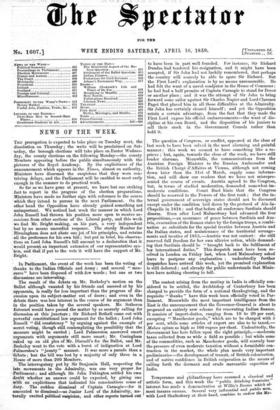- In Parliament, the event of the week has been
the voting of thanks to the Indian Officials and Army ; and several " mea- _sures " have been disposed of with few words ; but one or two discussions are interesting.
The result of the debate on Mr. Berkeley's motion on the Ballot although vaunted by his friends and sneered at by his _opponents, is really far less important than the progress of dis- cussion upon its subject-matter out of doors ; and even in the debate there was less interest in the course of its argument than in the position taken by the several speakers. Mr. Sotheron Estcourt would have passed the matter by as scarcely calling for discussion at this juncture ; Sir Richard Bethell came out with powerful constitutional law argument for the ballot ; Lord John Russell "did consistency" by arguing against the example of secret voting, though still contemplating the possibility that the measure might be carried ; Lord Palmerston answered smart arguments with arguments still more smart; Mr. Coningham raked up an old plea of Mr. Disraeli's for the Ballot, and Mr.
• Berkeley went to the vote with a burst of indignation at Lord tralmerston's "jaunty" manner. It was more a parade than a lebate ; but the bill was lost by a majority of only three in a . House of more than 200 Members.
The interrogatory put by Sir Benjamin Hall, respecting the late movements in the Admiralty, was one very proper for Parliament ; and although Sir John Pakington settled his own doubt whether an answer could be expected, by giving one with an explicitness that indicated his conscientious sense of duty. The sudden dismissal of Captain Carnegie—for it amounted to dismissal—as Junior Lord of the Admiralty, na- turally excited political suspicion, and other reports turned out to have been in part well founded. For instance, Sir Richard Dundas had tendered his resignation, and it might have been accepted, if Sir John had not luckily remembered, that perhaps the country will scarcely be able to spare Sir Richard. But the First Lord's explanation is by no means unreasonable. He had felt the want of a naval coadjutor in the House of Commons ; he had had a half promise of Captain Carnegie to stand for Dover or another place ; and it was the attempt of Sir John to bring forward some sailor against Sir Charles Napier and Lord Clarence Paget that placed him in all those difficulties at the Admiralty. Sir John has certainly cleared himself; and yet the Opposition retain a certain advantage, from the fact that they made the First Lord expose his official embarrassments—the want of dis- cipline at his own Board, and the disposition of his juniors to sell their stock in the Government Consols rather than hold it.


























